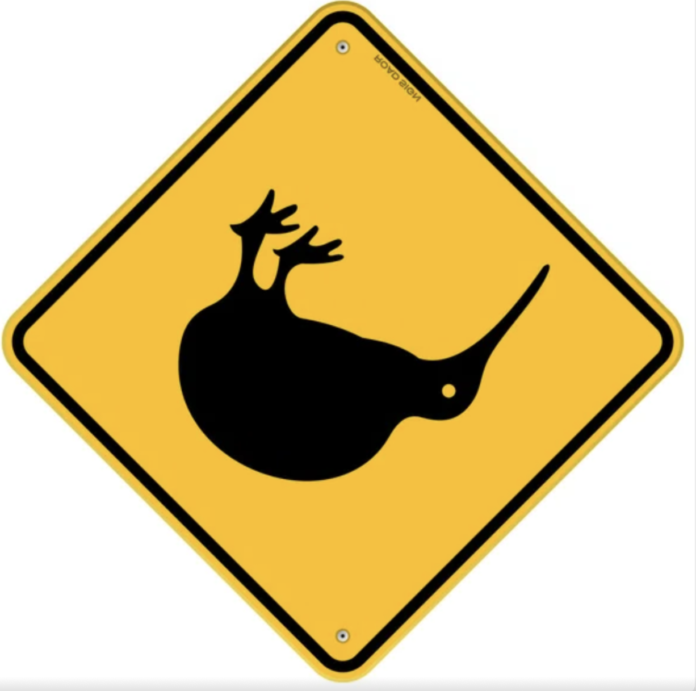Some people may be surprised at criticism of the New Zealand government for partnering with Blackrock – an American multinational investment company, to create a $2 billion climate infrastructure fund.
The aim is to help New Zealand become one of the first countries in the world to reach 100% renewable energy.
Sounds good.
Prime Minister Chris Hipkins called it “a watershed moment in our transition to 100% renewable electricity generation and our goal of net zero emissions by 2050.” (1)
But concerns about greenwashing have been raised by the announcement.
Questions are being asked about the impact on New Zealand’s reputation from the association. Blackrock’s ‘big problem’ includes a commitment to investing in destructive and exploitative industries.(2,3)
This is not the first time that ‘Reputation Risk’ has become a hot topic. Brand New Zealand has been hooked up before with brands that have dubious credentials.
Altrad, INEOS and The All Blacks

Recently The Guardian reported criticism of Altrad for spending millions as a sponsor for the All Blacks to whitewash it’s image. (4)
“The owners of a company that was one of the UK’s biggest manufacturers of asbestos have been accused of whitewashing their reputation by spending tens of millions of pounds on sponsoring the All Blacks rugby team while rejecting pleas for a £10m donation towards cancer research.”
The same concerns were raised when New Zealand Rugby confirmed petroleum giant INEOS as a new sponsor of the All Blacks.(5)
Under the new six-year deal, the All Blacks, Black Ferns, Sevens, NZ U20 and NZ Māori teams agreed to carry the new sponsor’s logo on playing shorts and training jerseys.
“To partner with INEOS and be part of such a unique and diverse global sports performance group is an exciting new venture,” said NZR chief executive Mark Robinson.
Environmental groups called out the problem of linking New Zealand’s reputation with INEOS – one of the largest manufacturers of chemicals and oil products.
Greenpeace criticised INEOS’s investment in sport as a way to distract from its environmentally unfriendly practices, including opposing proposals to regulate toxic and persistent ‘forever’ chemicals in microplastics.
“As the world turns against the corporations driving climate catastrophe, NZ Rugby must not sell our soul to an English oil corporate, which is cynically wanting to greenwash its image by associating with the All Blacks and our country’s environmental reputation,” said a spokesman for Greenpeace.
The issue is not just one of sports sponsorship or even just a New Zealand problem. Arts and culture are part of an expanding repertoire of sectors from education to health that companies use ‘to give back’ and gain a halo effect for their efforts. Until they are called out.
In 2022 The National Portrait Gallery became the latest UK cultural institution to sever fossil fuel links, by terminating its more than 30-year partnership with BP. (6)
A difference of views

For Brand New Zealand the issue of other brands wanting ‘what we have got’ sits at the heart of the sponsorship dilemma. The sponsor usually has ‘what we haven’t got’, ‘ which is money.
Problems arise when a shortage of money overtakes all other ‘human’ considerations. But people make judgements on the ‘company you keep’, and that goes for Brands as well as for people.
Indeed Brand theory positions brands as ‘people’ – what they do, what they stand for and believe in, their brand values and mission, how we feel about them, and who we trust. The ultimate negative manifestation of this is in the ‘rights’ that corporations have secured to allow them the freedom to sell their wares unhindered by wider human and environmental considerations.
Which is where the argument arises.
What one New Zealand organisation may see as a boost to their bottom line, other stakeholders in Brand New Zealand consider detrimental to an authentic and positive stance in the world.
In the example of the All Blacks sponsorships there is a conflict between those making the decisions and the wider community questioning the brand-fit. The implication is that custodians of Brand New Zealand, i.e. the people with decision-making powers, are out of touch with the wider values that New Zealanders hold dear.
The concern for Reputation Risk usually gets resolved by simply ignoring both the mismatch and the naysayers.
At least for now. (Rarely in New Zealand have organisations chosen to do the right thing and drop a sponsor, as has happened in the UK. It seems more often to happen the other way round with sponsors pulling their support when something negative hits the news).
Getting away with it

There is real-world evidence and quite a few academic reports that suggest ‘you can get away with it’. For a while.
Contributing to debate about how New Zealand should regulate Gene Editing are a number of published studies claiming to show there is no long-term harm to Brand New Zealand from release of GMOs. The studies go back decades, sometimes using dodgy promises that mislead consumers and show a ‘good number’ of people will buy GE food if you spin it and price it right. (7)
In these experiments the key to success is to discount the price for the GE product.
Price it cheap enough and they will buy it.
(Note to kiwi farmers, Fonterra, Federated Farmers, Beef+Lamb NZ et al– this not the best strategy for growers or exporters).
The conclusion from such studies is that consumer preferences for organic and non-GMO food can be overcome. They just need to be told; explained to, made informed.
Brands can get away with doing the wrong thing in the knowledge that people are busy and have short memories and btw, who really cares anyway.
That is the same secret sauce exposed by Theresa Gattung in her famous comments naming the ‘confusion marketing’ used by telecommunications companies. (8)
This was the view of some academics ten years ago, and still some today. The National Party’s policy to encourage commercial release of GE organisms is intent on overriding consumer sentiment by excluding New Genomic Techniques from tracing and labelling, taking away the choice.
If National win the upcoming election they will seek to ‘get away with it’ and put Brand New Zealand in the firing line.
In the firing line not just from overseas customers looking to New Zealand to be authentic in producing clean, safe GE-free and organic food, but from the lost opportunity to deliver wider benefits to the economy, environment and public health from a move to organic and regenerative agriculture.
However recent headlines are a disappointment and wake-up call for those promoting commercial release of GE organisms. Newsroom’s investigation into the failure of GE ryegrass trials in the US shows the repeated promise of GE ryegrass to solve farm emissions is simply not credible compared to existing and better options. (9)
Research by Plant and Food with the Urban Consumer found Gene Editing was the most rejected of all the new ideas explored in their study.(10)
In contrast is the demand for Brands to live up to what they say. The aim is to be authentic. “Do what it says on the tin” – assuming it is properly labelled. Many business and organisations have taken this to heart, rather than trying to whitewash or greenwash.
Real change to authentic sustainability and ethics are important for Brands to navigate the future. Brands gain leadership and advantage with consumers and employees when they consider environmental and social responsibility as must have, not nice to have. When a company has genuine intentions and is doing its best the consumer is much more likely to be forgiving when something goes awry.
Who owns Brand New Zealand?
It is easier to say who owns Brand New Zealand than it is to say who is in charge of managing it.
Brands represent a set of associations and feelings that serve as a short-cut to evaluating what is on offer. Instead of having to read the back of the label, the name on the tin delivers a sense of trust and confidence in what we are getting.
As such, Brand New Zealand is collectively owned in our imagination, distributed across the minds and hearts of all of us as stakeholders. It is this shared ‘ownership’ that leads to public concern when Brand New Zealand gets it wrong and gets hooked in with the wrong types.
In terms of who is the Brand ‘manager’ a similar argument can be made that it is a collective effort, built by the small businesses and larger exporters who leverage their brand association with New Zealand.
Sitting outside the corporate brand model there is also the role of tangata whenua as kaitiakitanga giving Aoteraoa its unique identity.
There is also official custodianship through the New Zealand Story, the government agency in charge of Aotearoa country branding.Their work includes licensing the FernMark to promote trust and authenticity in our products.(11)
The FernMark is a registered trademark in 13 countries across 44 classes, and provides an added layer of legal protection in key export markets.
Interviewed by The Place and Brand Observer, Rebecca Smith – former Director of the New Zealand Story said:
“The New Zealand Story was established to create a common thread so all sectors, public and private, could work harmoniously to present a consistent and compelling New Zealand story to the world. We researched within the country and gathered perspectives from offshore markets to develop a “story” underpinned by a set of values that resonated both domestically and internationally.” (12)
So, what does Brand New Zealand stand for now?
It depends what aspect of the economy we are looking at. There is a different lens for food, tourism, technology, the employment brand and our digital presence. But it is the commonalities that serve to guide the brand’s collective advantage and trajectory.
“We describe New Zealand as being a progressive nation of creative, ingenious people who challenge the status-quo to create new solutions, whilst always caring for people, place and planet,” said Rebecca Smith.
“Our nation is built on three values: Kaitiakitanga (a Māori term meaning intergenerational guardianship of people, place and planet), Ingenuity (which is different to innovation), and Integrity (which sums up the trust that others have that we will always do what’s right). Put simply, we’re a nation whose aim is to be good for the world.
“Country-of-Origin in our case has over time become less about the functional attributes of our country (the land, water and air) and more about the emotional trust a consumer has in the products, services and people who originate from our nation (emphasis added).
“Morality, transparency and integrity are more important to a consumer and these attributes transfer to trust in what you produce.”
Which is all good. But casts a shadow over the INEOS All Blacks, concerns about greenwashing by Blackrock, and the National Party’s push for commercial release of GMOs. Removal of transparency for Gene Edited food denies consumers at home and abroad their right to chose. It’s not moral. It’s not transparent. It’s not building trust. It’s not on Brand.
1) https://www.beehive.govt.nz/release/first-its-kind-climate-fund-back-100-renewable-electricity
2) https://blackrocksbigproblem.com
6) https://www.ft.com/content/c3ab1b10-ee06-4fac-abe9-1a1e4dcef39f
7) https://press.gefree.org.nz/press/20120826.htm
9) https://www.newsroom.co.nz/grass-isnt-greener-for-gm-trial-in-australia
11) https://www.nzstory.govt.nz/
12) https://placebrandobserver.com/rebecca-smith-interview/
Jon Carapiet: Born in Ghana and educated at Cambridge and Auckland Universities, Jon is a consumer researcher and advocate, photographer and writer. Jon started talking about valuing and protecting Brand New Zealand in the early 2000’s and is spokesman for GE-Free NZ (in food and environment). Twitter jon@brandnewzealand





The PRC dictatorshit does.
Jon – My problem with the Blackrock deal is the total lack of any real details…such as fees, obligations..etc, etc
It’s a pretty narrow sort of brand. Food exports and tourism, and virtually nothing else.
A wealthy British Commonwealth country could easily use its national reputation as a selling point for exports of high-end complex goods. But that would require protecting infant industries with tariffs, and a vassal of Wall Street globalism could never be allowed to do that!
Unless we want to develop by growing vegetables in the back garden and barter goods amongst ourselves whatever we get involved with is dirty in some way. I’m trying to think of a large company that doesn’t manufacture, utilise minerals, use chemicals and fossil fuels or use shipping or aircraft. The new food without meat is dirty and meat is dirty. Who do we use to borrow money from or sponsor us that you can’t pick holes in. If a company oversteps the dirty mark more than necessary it should be held to account. Remembering that all our industries no matter how green they look on the outside are grubby inside. Criticism of INEOS. May make us feel morally superior but that’s about all it does IMO.
This has turned into a rant Jon. But it has some good bits in it I think. Perhaps its place would be later on at the bottom of a lot of shorter and more salient comments?
The aim is to help New Zealand become one of the first countries in the world to reach
100% renewable energy.
That 100% goal announced about everything makes me shiver! Bloody Labour and Greens vainglory again; no practicality. We have led the world again!! We rejoiced in doing this with Roger’s and Labour embracing of hard-nosed financiers and their promises and opening us up like a Filipino psychic surgeon so he could sell off our important bits to whomever. It apparently seemed sexy at the time.
Labour seems still high since Jacinda was renowned and received overseas after the Christchurch massacre and our attempts to show sympathy to those bereaved from a foreign maniac, not even home-grown! (The practical sympathy didn’t last long – I think within 6 months women, whose husbands were murdered/badly injured, who were victims killed because being from a foreign country with religious significance and different tikanga to NZ/AO, were being told to leave their children and go to work).
Our politicians continue to make bold statements and strut like turkeys. Those birds are a well-known USA dish but our pollies have added our precious kiwis to the USA groaning table, metaphorically. And many of the ideas being raised have originated in that country or from the hollowed-out British Empah residue. And you betcha they cost money which we only appear to have by selling off bits of what we thought was our country and infrastructure and tattered moral integrity (eg pirating fees from immigrants without guarantee that they will receive what they were led to expect once they got here).
What a spineless, self-satisfied, ignorant, complacent bunch our democracy has produced. We wouldn’t understand the old UK saying ‘I’m not as green as I’m cabbage-looking’ because we haven’t got enough wit and wisdom to wonder – there are a lot of good words starting with ‘w’.
We need more contemplation and curiosity and assessment of our faults not mountains of ice-cream and self-esteem that we lather about us. To be strong one needs to know oneself thoroughly good and bad tendencies., and that applies to knowing one’s society too.
Sun Tzu 544– 496 BC
One need not destroy one’s enemy. One need only destroy his willingness to engage.
and
To conquer the enemy without resorting to war is the most desirable. The highest form of generalship is to conquer the enemy by strategy.
https://www.azquotes.com/author/19687-Sun_Tzu/tag/enemy
Sun Tzu said – Know the enemy and know yourself in a hundred battles you will never be in peril. When you are ignorant of the enemy but know yourself, your chances of winning or losing are equal. If ignorant both of your enemy and of yourself, you are certain in every battle to be in peril.
Sun Tzu, Clausewitz, and the Importance of Knowing Yourself …
dtic.mil https://apps.dtic.mil › sti › citations › ADA440962
Why Aristotle Said: Knowing Yourself is The Beginning of All …
Knowing yourself lets you live the life you truly want — you know who you are, what you want, and what brings out the best in you. If you don’t have a full understanding of who you are, you will continue to make decisions against your true self. Growth in life and career starts with self-knowledge.27 Mei 2021 (I think a business-styled version.)
Why Aristotle Said: Knowing Yourself is The Beginning of All Wisdom
linkedin.com https://www.linkedin.com › pulse › why-aristotle-said-kn.
Sun Tzu again – All warfare is based on deception. Hence, when able to attack, we must seem unable; when using our forces, we must seem inactive; when we are near, we must make the enemy believe we are far away; when far away, we must make him believe we are near.
https://www.azquotes.com/author/19687-Sun_Tzu/tag/enemy
(I think we have to practice some deception, judiciously, practical strategy. One thing is never to state a 100% goal; that in itself is the first deception.)
100% renewables is 100% impossible given the current state of the art and would be more environmentally damaging even if you could achieve it.
Anyone who says otherwise is purposely lying or is a fucking moron.
Stalinda and co said “trust the science” on COVID all the while lying about what the science actually showed.
Same with the renewables scam.
There is a tone in your comments Jays that inspires me to think you may be the King of Black Rock here on TDB, if that is a heavy metal band making raw noise and clashing percussion.
If anyone made up a list of everything wrong and corrupt about capitalism, that list would be called “Blackrock”. So amazing to see once were socialists (now multi millionaires) like Ardern actively courting and swooning over them.
Once Hipkins has lined his pockets (nit long now), he will be another rabid capitalism supporter.